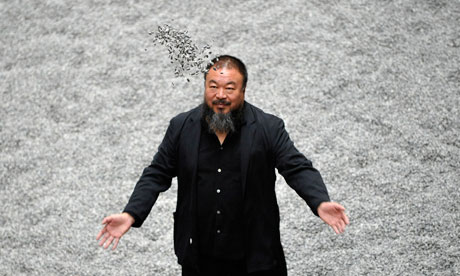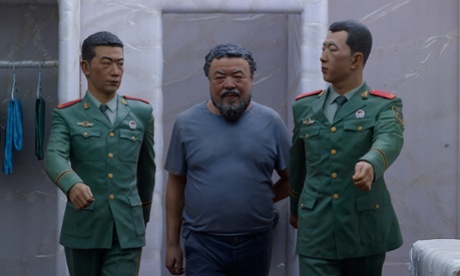May was a big month for Ai Weiwei, probably China's best-known artist internationally. After his Sunflower Seeds installation at Tate Modern, his latest exhibit, Circle of Animals, opened at Somerset House in London and at the Grand Army Plaza in New York. It consists of a dozen 4ft high animal heads cast in bronze that recreate the Zodiac sculptures at the Old Summer Palace on the edge of Beijing, which was destroyed by a British-French punitive expedition in 1860.
Yet Ai wasn't present to celebrate. He is under detention in China, accused of unspecified "economic crimes". A Communist party newspaper, Global Times, dismissed him as a third-rate artist. Amid protests around the world, the Foreign Ministry in Beijing said simply that Ai's case was under investigation and that other countries should stop commenting.
According to the ministry, his detention had nothing to do with human rights or free expression. It is, indeed, true that many people in China can be had up for "economic" infringements given the many grey areas of the way business is done. But the detention comes at a time when, after the upheaval in the Arab world, China's security apparatus has gone into overdrive and it is in this context that it has to be viewed.
This collection of blog posts, put out with superb coincidental timing, makes plain that Ai is much more than the playful, somewhat exhibitionist dilettante of Chinese art he sometimes seems. His posts go to the heart of moral and ethical fault lines running through his country, raising issues that China boosters in the west prefer to sidestep. The People's Republic, he suggests, is like a runner surging ahead, but with a heart condition. His blogs are a call not for political change, as such, but for a cleaner morality in the last major state ruled by a communist party. He homes in on the scandals and disasters that victimise ordinary citizens but leave the officials responsible largely unscathed, such as the many children buried alive in the Sichuan earthquake of 2008 because their schools were made of substandard materials (known in China as "tofu" buildings), the funds having been creamed off by local bureaucrats.
"They close their mouths and do not discuss corruption, they avoid the tofu-dregs construction," he writes of the official attitude to the disaster that killed some 80,000 people in all. "They conceal the facts, and in the name of 'stability' they persecute, threaten and imprison the parents of the deceased children who are demanding to know the truth."
For years, Ai enjoyed a form of immunity since his father was a revolutionary poet who stood beside Mao Zedong at the proclamation of the People's Republic in 1949. He was commissioned as one of the designers of the Bird's Nest stadium for the 2008 Olympics and seemed able to get away with his role as an artistic gadfly, a kind of Chinese Salvador Dalí. But now the boom has come down in a country that keeps its only resident Nobel prize winner, the 2010 peace laureate Liu Xiaobo, in jail for organising a petition advocating democracy. Because Ai is known internationally, he has been transformed into a symbol of those who fall foul of China's relentless security machine, undermining Beijing's efforts to win friends through "soft diplomacy". At the opening of Circle of Animals in Manhattan, Michael Bloomberg, the New York mayor, linked Ai's detention to "the billions of people who do not have the most fundamental of all human rights… free expression".
Jonathan Fenby is working on a book about contemporary China









